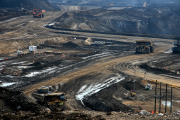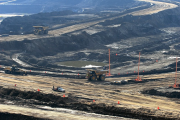The proposed takeover of Nexen by China’s state-owned CNOOC Ltd. has Canada’s pollsters, politicians and pundits busily talking up the pros and cons of Chinese investment in Canada’s resources — and last week’s announcement of an extension of Industry Canada’s review means that conversation is far from over.
But given that Calgary-based Nexen is a significant player in Alberta’s oilsands — a region that’s become a lightning rod for environmental criticism — it’s surprising how little of the debate has been about what it could mean for responsible development of the oilsands.
First, the good news: Ottawa’s review process on a deal like this one gives the federal government the chance for a small-scale environmental win.
Industry Canada’s review process for the takeover — particularly the net benefit test — has drawn political fire for its vagueness and lack of transparency.
There’s no doubt that the criteria laid out in the Investment Canada Act are broad (or to put it more charitably, flexible) and open to interpretation. But a government concerned about sustainability could use that vagueness to its advantage: a law that requires the government to assess the transaction’s effects on economic activity, resource processing, exports and innovation provides more than enough hooks to require leading environmental practices as conditions of approval.
We’re not the only ones thinking along these lines: Alberta Premier Alison Redford has reportedly asked the federal government to hold CNOOC to firm environmental standards.
So CNOOC’s $15-billion takeover proposal could be the pretext for Ottawa to negotiate strong greenhouse gas, conservation and liability undertakings with the company as part of determining whether the deal is ultimately good for Canada. Extending the review process, as Industry Canada did this week, means the window to get those commitments nailed down is still open.
CNOOC’s bid also illustrates what can happen when Ottawa does set (or even suggests) a standard for companies to meet. Industry Canada has a policy statement explaining what the net benefit test means for state-owned enterprises. The guidelines suggest that preserving Canadian jobs, incorporation in Canada, and listing the company on a Canadian stock exchange are all good commitments to make.
CNOOC’s response? Their proposal includes jobs for current employees, a head office in Calgary, and a TSX listing for the company.
And that brings us to the bad news: right now, Ottawa isn’t asking for environmental leadership from oilsands companies.
For a company looking to buy into Canada’s resource sectors, keeping quiet about the environment is the approach that best lines up with the Harper government’s pattern of sidelining environmental considerations in the drive to develop the oilsands. So it’s perhaps not surprising that the only environment-related commitment that CNOOC has made to date (in public, at least) is to continue Nexen’s participation in Canada's Oil Sands Innovation Alliance, a group of oilsands companies collaborating on environmental challenges.
As Natural Resources Canada points out, Canada holds about 13 per cent of the world’s proven oil reserves but about 60 per cent of the world’s oil that is accessible to private investment — so we would be wise to prepare for increased foreign interest in Canadian oilsands companies.
If the Harper government does spell out its “net benefit” criteria in more detail to prepare for that eventuality, real responsible development should be an explicit part of the conversation. It’s 2012. Given everything we now know about climate change and sustainable development, a meaningful “net benefit” test for Canada has to feature environmental considerations among its tenets.
You could argue that singling out CNOOC or other foreign companies isn’t fair: after all, like any other oilsands operator, they would have to abide by existing federal and provincial environmental regulations after a takeover goes ahead. And of course that’s true. But because those requirements are widely understood to be too weak or — in the case of the federal government’s promised greenhouse gas regulations for the oil and gas sector — currently non-existent, a growing number of oilsands companies feel they have to do more than the current rules require in order to win public support for their operations.
In the jargon of the oilsands sector, companies talk about going “beyond compliance” to win “social license” to keep doing business. Suncor, for example, aims to beat government standards in four environmental categories; MEG Energy uses the same phrase (“beyond compliance”) in describing its environmental track record — and CNOOC is already a minority shareholder of that company.
So it’s not too much to ask for CNOOC to go “beyond compliance,” as some of its peers are doing.
But while it’s nice to see some companies volunteering to do more, the bottom line is that governments clearly aren’t asking for enough. The bar needs to be raised if companies, and governments, hope to win Canadians’ support for oilsands development. That’s true of the regional impacts on air quality, water, land and wildlife that the Government of Alberta is responsible for managing. It’s even more glaring in the case of Ottawa’s approach to the oilsands’ ever-growing greenhouse gas pollution.
One-offs and volunteerism will only get us so far. We’ll need to see Alberta and Ottawa adopt much stronger rules to actually change the way development happens in Canada’s most environmentally controversial sector. For the federal government, that means fulfilling its promise of regulating the oil and gas sector’s greenhouse gas pollution as a bare minimum, and then moving quickly from there to — dare we say it? — charging a serious carbon price.
Speaking in Calgary last month, CIBC executive and former environment minister Jim Prentice said that “energy leadership and environmental leadership are now two sides of the same coin. Canada will either be an environmental leader or have other jurisdictions attempt to dictate our environmental policies.”
In that particular speech, Prentice’s reference to “other jurisdictions” meant the United States. But if we don’t get a better grip on our environmental footprint, his words could one day apply to China too.






